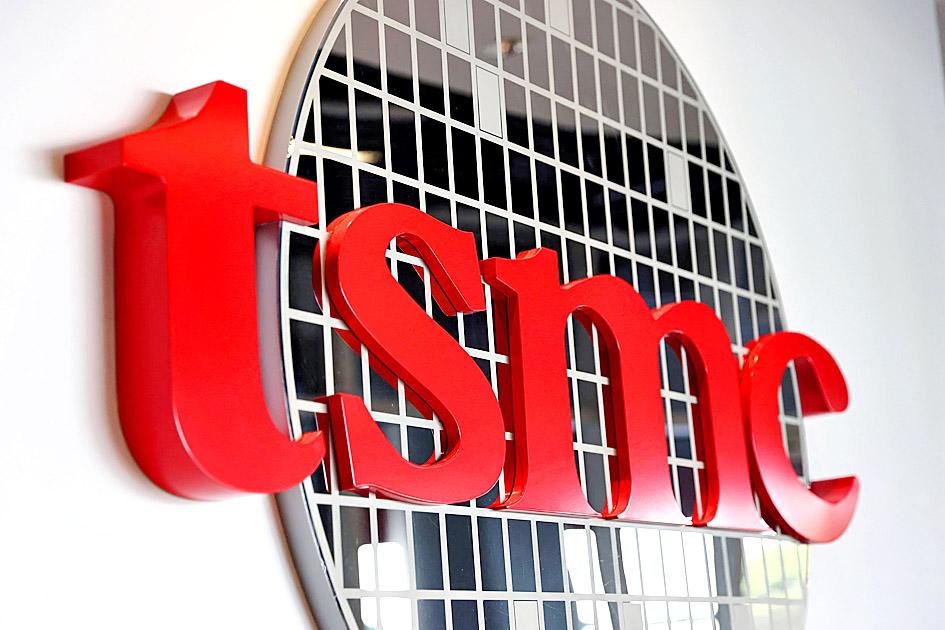Taiwan Semiconductor Manufacturing Co (TSMC, 台積電) yesterday said that its board of directors approved a proposal to subsidize employees’ purchases of TSMC shares by covering 15 percent of investments, the chipmaker’s latest effort to recruit and retain talent.
Employees of TSMC and its fully owned subsidiaries would be allowed to allocate 15 to 20 percent of their monthly salary for share purchases, based on a company employee stock purchase plan, the chipmaker told the Taipei Times.
The plan is to take effect in August or September, it said.

Photo: Ann Wang, Reuters
The board also approved the distribution of a cash dividend of NT$2.75 per share for last quarter, the same as the dividend for the previous four quarters.
That represented a payout ratio of 35.17 percent based on the firm’s earnings per share of NT$7.82 in the quarter ended on March 31.
The board also approved capital appropriations of about US$16,757.67 million to install or upgrade advanced technology capacity, install mature and specialty technology capacity, as well as install or upgrade advanced packaging capacity.
The capital would also be used to capitalize leased assets, it said.
TSMC has budgeted record capital expenditure of US$40 billion to US$44 billion this year, primarily for advanced processes, including 2-nanometer and 3-nanometer technologies.
Separately, TSMC has informed customers of a 6 percent price hike for next year, reports said.
TSMC usually does not comment on pricing.

NEW IDENTITY: Known for its software, India has expanded into hardware, with its semiconductor industry growing from US$38bn in 2023 to US$45bn to US$50bn India on Saturday inaugurated its first semiconductor assembly and test facility, a milestone in the government’s push to reduce dependence on foreign chipmakers and stake a claim in a sector dominated by China. Indian Prime Minister Narendra Modi opened US firm Micron Technology Inc’s semiconductor assembly, test and packaging unit in his home state of Gujarat, hailing the “dawn of a new era” for India’s technology ambitions. “When young Indians look back in the future, they will see this decade as the turning point in our tech future,” Modi told the event, which was broadcast on his YouTube channel. The plant would convert

‘SEISMIC SHIFT’: The researcher forecast there would be about 1.1 billion mobile shipments this year, down from 1.26 billion the prior year and erasing years of gains The global smartphone market is expected to contract 12.9 percent this year due to the unprecedented memorychip shortage, marking “a crisis like no other,” researcher International Data Corp (IDC) said. The new forecast, a dramatic revision down from earlier estimates, gives the latest accounting of the ongoing memory crunch that is affecting every corner of the electronics industry. The demand for advanced memory to power artificial intelligence (AI) tasks has drained global supply until well into next year and jeopardizes the business model of many smartphone makers. IDC forecast about 1.1 billion mobile shipments this year, down from 1.26 billion the prior

People stand in a Pokemon store in Tokyo on Thursday. One of the world highest-grossing franchises is celebrated its 30th anniversary yesterday.

Zimbabwe’s ban on raw lithium exports is forcing Chinese miners to rethink their strategy, speeding up plans to process the metal locally instead of shipping it to China’s vast rechargeable battery industry. The country is Africa’s largest lithium producer and has one of the world’s largest reserves, according to the US Geological Survey (USGS). Zimbabwe already banned the export of lithium ore in 2022 and last year announced it would halt exports of lithium concentrates from January next year. However, on Wednesday it imposed the ban with immediate effect, leaving unclear what the lithium mining sector would do in the